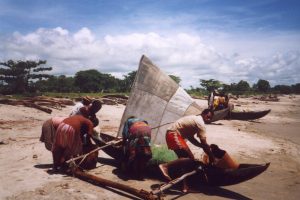
The campaign for Tenure Rights seeks a balance between equitable development of fishing communities and the conservation and sustainable use of natural resources on which they depend. The SSF Guidelines make it clear that secure tenure rights to the fishing grounds, to land and other resources form the basis for the social and cultural well-being of fishing communities.
Secure tenure rights are essential for equity, justice and conservation. They promote security of livelihood and food, human rights, gender equity, cultural and generational identities, ecological sustainability, and decentralized organizational structures. They help address poverty and the impacts of climate change and resource degradation.
Several international legal instruments support exclusive rights for the SSF community to marine resources, fishing grounds and adjacent lands. SDG-14.b seeks to provide access to marine resources and markets for small-scale artisanal fishers. FAO’s SSF Guidelines are aware that exclusive zones alone are meaningless for SSF communities, unless secure tenure are granted. Moreover, secure tenure must extend to adjacent lands fishing communities use for processing and allied activities. In sum, tenure rights must be integrated into one coherent framework.
A priority of this campaign is the creation of a small-scale artisanal fishing zone or SFZ. This means a customary or formally designated marine or coastal area where traditional fishers—men and women, with or without craft, using non-towed and compatible fishing gear—are granted preferential access rights for a stipulated period of time. This must uphold the principles of equity, justice, safety, conservation and sustainable use of marine resources.
India (Andhra Pradesh)
This campaign is focused on the implementation and strengthening of existing policy. Then come new policies that support the creation, implementation and expansion of SFZs in the coastal Indian state of Andhra Pradesh (AP). Communities using non-towed gear need help and support. This will reduce the destructive impact of towed gear. This depends on protected spaces for non-towed fishers.
Here, non-towed SSF refers to those using non-motorized craft up to 24 ft in length and small motorized craft with motors up to 10 horsepower engines. (Their motors must be solely for propulsion, not for gear deployment or retrieval.) It includes fishers not using any craft, relying only on non-motorized, non-mechanized gear. Towed fishing essentially refers to mechanized trawling and includes beam trawl, demersal trawl, pelagic trawl, high-open bottom trawl, pair trawl, twin rig trawl and multi rig trawl. Encircling gear refers to ring and purse seiners.
Working with fishworkers’ organizations in AP, this campaign has understood the concerns regarding SFZs. It is working to formulate customized solutions. To create broad collaborations. It valorizes the fishing community by documenting and highlighting their practices and techniques, their culture and their resource management systems. It shows the importance of conservation and sustainable use of marine living resources for food and nutrition security.
For more details, please visit: https://www.icsf.net/campaign/